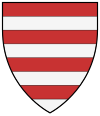Arpad dynasty
| Árpád dynasty | |
|---|---|
 |
|
| Country |
Principality of Hungary, Kingdom of Hungary |
| Titles | King of Hungary, Dalmatia, Croatia, Cumania, Slavonia, Bulgaria, Lodomeria, Duke of Styria |
| Founded | c. 855 |
| Founder | Álmos |
| Final ruler | Andrew III |
| Dissolution | 1301 |
The Árpáds or Arpads (Hungarian: Árpádok, Croatian: Arpadovići, Serbian: Арпадовци/Arpadovci, Slovak: Arpádovci, Turkish: Arpatlar) was the ruling dynasty of the Principality of Hungary in the 9th and 10th centuries and of the Kingdom of Hungary from 1000 to 1301. The dynasty was named after Grand Prince Árpád who was the head of the Hungarian tribal federation during the conquest of the Carpathian Basin, c. 895. It is also referred to as the Turul dynasty, but rarely.
Both the first Grand Prince of the Hungarians (Álmos) and the first King of Hungary (Saint Stephen) were members of the dynasty.
Seven members of the dynasty were canonized or beatified by the Roman Catholic Church; therefore, since the 13th century the dynasty has often been referred to as the "Kindred of the Holy Kings". Two Árpáds were canonized by the Eastern Orthodox Church.
The dynasty came to end in 1301 with the death of King Andrew III of Hungary, while the last member of the House of Árpád, Andrew's daughter, Blessed Elizabeth of Töss, died in 1336 or 1338. All of the subsequent kings of Hungary (with the exception of King Matthias Corvinus) were cognatic descendants of the Árpád dynasty. The House of Croÿ and the Drummond family of Scotland claim to descend from Princes Geza and George, sons of medieval Hungarian kings: Geza II and Andrew I, respectively.
...
Wikipedia
